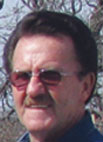
North of Lebanon, Mo., on a tract of land bordered by the rich Niangua River, and adjacent to regal bluffs and hillsides lies an 800-acre farm with a long, rich history.
The farm was first homesteaded by a civil war veteran who built the home that brothers Albert and Matthew Hempel still live in today. Carved into the hillsides sloping down to the Niangua River and visible to the front porch of the house are random treeless alleys where the ties were once slid to the awaiting river highway below.
Today the Hempel brothers are continuing to farm the same bottom land across the river from those hillsides. Their father bought the 800- acre farm in 1979 when the family moved from a dairy farm in New York to better markets and warmer climate.
The family raised hogs, pasture poultry and beef cattle up until 2007 when feed prices forced them to cut back to just cattle. "Now we are full time beef farmers with a sawmill on the farm and we do custom combining around the area," said Albert.
The farm is about half pasture and half timber. The brothers raise over 200 stocker steers which are in several herds with around 60 black Angus cow-calf pairs. The two bulls are black Angus as well.
The fescue/white clover fields are lush and rich and easily support the cattle on the farm—but not without some careful planning and strategic fencing. "Several years back we realized the benefits of dividing our fields into smaller pastures to graze our animals. We were never trained in a rotational grazing program, we just watched our cattle closely and made changes according to what worked best for them," added Albert.
Albert also traps on the river. "I started trapping at age 16," he said. A couple years ago Albert took over the position of editor for the Missouri Mountain Men of the Missouri Trapper's Association. He moved the magazine from an annual to a quarterly publication.
The Hempel brothers take a lot of pride in the knowledge of the stockman and understanding animal husbandry. Albert asked, "Have you ever heard the saying 'The eye of the master fatteneth his cattle'? That's how we try to raise our animals." Albert and Matthew have faithfully developed a watchful eye for the animals on their farm. They can tell when a steer is ready for the market, without weighing or generalizing. "We've seen them enough to know when they're going to taste the best, and we usually keep them until that point." It's fitting that the name of their farm is "Semper Fidelis Ranch." Along with that, the brothers are very patient and gentle with their cattle.
Albert even sings to them in the fields to get them to follow him into the next paddock of their rotational grazing system.
Along with cattle, timber and combining, the Hempel brothers also buy and salt deer hides when in season to sell to brokers who sell to leather glove makers. "We always have plenty of leather gloves for the winter," laughed Albert.
The farm has a huge tree with a wild bee hive bored into the base of it where families in the past harvested honey on the farm. There's also an old trench silo on the farm that at one time was fully operational and quite unique.
"There's a lot of history on this farm," added Albert as he was describing the old Newton family cemetery in the middle of the farm.
A lot of history, a lot of river, a lot of land, and two brothers who appreciate it and are continuing to enrich Semper Fidelis Ranch.







